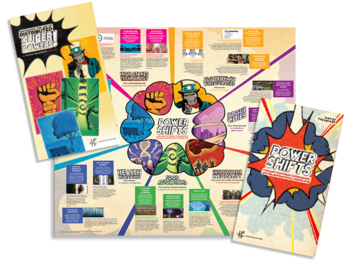Power Shifts: Consequences & Possibilities

Power Shifts
A Decade of Extreme Consequences and Transformational Possibilities
 In the early 1980s, sociologist Charles Perrow wrote the classic book Normal Accidents: Living with High-Risk Technologies. It explored (among other system breakdowns) the chain reaction of small failures that resulted in the Three Mile Island nuclear meltdown. Perrow argued that in complex, tightly coupled systems, in which multiple components are highly dependent on each other, extreme accidents are normal events. He chose the title to highlight the increased fragility of these systems, where accidents don’t stem from one huge error but rather a series of small errors that cascade in unpredictable ways. Authors Chris Clearfield and András Tilcsik revisited this framework in their 2018 book Meltdown: Why Our Systems Fail and What to Do About It to argue that in the years since the publication of Normal Accidents, virtually every organization and system has become more tightly coupled and complex to the point of incomprehensibility.
In the early 1980s, sociologist Charles Perrow wrote the classic book Normal Accidents: Living with High-Risk Technologies. It explored (among other system breakdowns) the chain reaction of small failures that resulted in the Three Mile Island nuclear meltdown. Perrow argued that in complex, tightly coupled systems, in which multiple components are highly dependent on each other, extreme accidents are normal events. He chose the title to highlight the increased fragility of these systems, where accidents don’t stem from one huge error but rather a series of small errors that cascade in unpredictable ways. Authors Chris Clearfield and András Tilcsik revisited this framework in their 2018 book Meltdown: Why Our Systems Fail and What to Do About It to argue that in the years since the publication of Normal Accidents, virtually every organization and system has become more tightly coupled and complex to the point of incomprehensibility.
The interconnectivity and interdependence of our global systems have undoubtedly created new and previously inconceivable risks, but at the same time, they’ve enabled previously unattainable efficiencies, supercharged innovation, and empowered individuals and startups with new abilities. These dynamics have led to a world in which it’s no longer surprising to see tiny players make global impacts, from an individual reshaping international politics to a business scaling from zero to billions of dollars in a couple of years.
Power—the ability to shape consequences—has traditionally flowed from the top down. But in this tightly coupled and complex landscape, power flows in all directions: not just top-down or bottom-up but across industries, continents, and stakeholders of all scales.
How to use this research
In 2019, our Ten-Year Forecast Summit was a 2-day immersion in the extreme powers and equally extreme consequences that will define the coming decade for businesses, communities, and individuals around the world. From the ethical navigation of new technologies to the adaptation strategies of climate change, we scoured the world for power plays that will help organizations to both cultivate and responsibly wield the superpowers of the twenty-first century.
NAVIGATING THE NEXT DECADE
Dynamics of shifting power within and across domains will require new ways of thinking about how actors can affect us, who we can influence, and how to make sense of the increasingly fuzzy boundaries between organizations, industries, and nations.
As the next decade unfolds, these factors will contribute to the extreme possibilities and opportunities to effect transformational change. Build your world readiness by immersing yourself in this map of the emerging landscape and identifying your path forward.
Empowering New Actors and Movements
Disappearing Boundaries
Anticipating Brittle Points of Failure
Managing Systems Risks within Organizations
2019 World-Readiness Toolkit
 Navigating this landscape demands building a discipline of world-readiness. World-readiness comes from systematically exploring extreme possibilities to prepare for the pitfalls and find the transformational opportunities of the coming decade. Download the complete World-Readiness Toolkit to start learning how to use with your team:
Navigating this landscape demands building a discipline of world-readiness. World-readiness comes from systematically exploring extreme possibilities to prepare for the pitfalls and find the transformational opportunities of the coming decade. Download the complete World-Readiness Toolkit to start learning how to use with your team:
- Start with the brief Introduction to the Toolkit
- Then jump into our World-Readiness Guide and quickly familiarize yourself with the tools and resources you’ll need to make sense of the coming decade.
- Next, open the Map of the Decade to overview the major power shifts redefining boundaries within the business landscape.
- Finish up by exploring the Scenario and Superpower Card Deck, which presents high-risk possibilities resulting from extreme global forces between now and 2030, along with the levers you can respond with to create resilience and optimism.
Get In Touch!
Interested in engaging with early research exclusively available to IFTF Vantage partners?
John Clamme | jclamme@iftf.org | 650-233-9517




